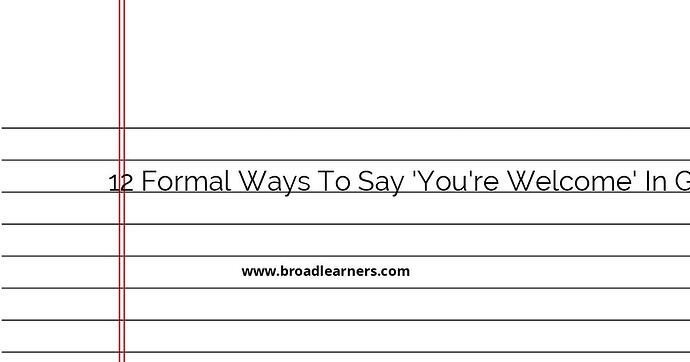When someone says 'thank you' to you in German, it is polite and courteous to respond with a 'you're welcome' or an equivalent phrase. Here are 12 formal ways to say 'you're welcome' in German:
- Gern geschehen - This is the most common way to say 'you're welcome' in German. It literally means 'happened gladly' and is used in most situations.
- Bitte - This is a versatile phrase that can mean 'please' as well as 'you're welcome' in certain contexts. It can be used in response to a thank you as a polite acknowledgment.
- Keine Ursache - This phrase translates to 'no cause' or 'no problem' in English. It conveys the message that your assistance was no trouble at all.
- Gerne - This word means 'gladly' and can be used as a concise way of saying 'you're welcome' in a friendly but formal manner.
- Es war mir ein Vergnügen - This phrase translates to 'it was a pleasure for me' and is a formal way to express that it was a pleasure to assist someone.
- Nichts zu danken - This phrase means 'nothing to thank for' and is used to imply that no thanks are necessary as your assistance was expected or a part of your duty.
- Das war selbstverständlich - Translating to 'that was self-evident,' this phrase conveys the idea that your help was expected or normal in the given situation.
- Herzlich gern - Translating to 'heartily gladly,' this phrase expresses that you were happy to be of assistance.
- Sie sind willkommen - This formal phrase means 'you are welcome' and is suitable for more formal situations or when addressing someone with respect.
- Es war mir eine Freude - This phrase means 'it was a pleasure for me' and is similar to 'es war mir ein Vergnügen' but has a slightly different tone and can be used interchangeably.
- Als Etwas habe ich es gerne getan - This phrase translates to 'as something I gladly did it' and is a more elaborate way to express that you were happy to help.
- Sie brauchen sich nicht zu bedanken - This phrase means 'you don't need to thank' and is used to indicate that your assistance was expected or a part of your responsibility.
Now that you know 12 formal ways to say 'you're welcome' in German, you can choose the most appropriate one depending on the situation and level of formality. It's always a good idea to show politeness and gratitude when responding to someone's appreciation.
Did I miss anything? Respond below
